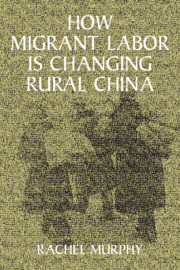Book contents
- Frontmatter
- Contents
- List of Exhibits
- Acknowledgments
- Glossary
- Poem: “I Work in the City”
- Map People's Republic of China
- Map Jiangxi Province
- Introduction
- 1 Values, Goals, and Resources
- 2 China, Jiangxi, and the Fieldwork Counties
- 3 Resource Redistribution and Inequality
- 4 Migration, Remittances, and Goals
- 5 Recruiting Returnees to Build Enterprises and Towns
- 6 The Enterprises and the Entrepreneurs
- 7 Entrepreneurs, Socioeconomic Change, and Interactions with the State
- 8 Returning Home with Heavy Hearts and Empty Pockets
- 9 Conclusion
- Notes
- Bibliography
- Index
9 - Conclusion
Published online by Cambridge University Press: 09 November 2009
- Frontmatter
- Contents
- List of Exhibits
- Acknowledgments
- Glossary
- Poem: “I Work in the City”
- Map People's Republic of China
- Map Jiangxi Province
- Introduction
- 1 Values, Goals, and Resources
- 2 China, Jiangxi, and the Fieldwork Counties
- 3 Resource Redistribution and Inequality
- 4 Migration, Remittances, and Goals
- 5 Recruiting Returnees to Build Enterprises and Towns
- 6 The Enterprises and the Entrepreneurs
- 7 Entrepreneurs, Socioeconomic Change, and Interactions with the State
- 8 Returning Home with Heavy Hearts and Empty Pockets
- 9 Conclusion
- Notes
- Bibliography
- Index
Summary
THIS book has focused on the effects of rural–urban labor migration on China's countryside. This is a massive phenomenon affecting hundreds of millions of people. But people are not simply swept along by social and economic forces, they also actively create and manipulate them. Macro-level descriptions and figures, of necessity, omit the individual human detail. I believe that this detail is central to the explanation of migration and the changes it precipitates. My in-depth qualitative data has permitted an understanding of the human strategies and experiences that lie behind macro-processes.
I have shown that many people directly benefit from migration while others suffer increased hardships. Nevertheless, overall, migration improves the lives of the rural population by broadening perspectives, improving the availability of resources, and increasing the opportunities for attaining goals.
In much of the Western literature and in Chinese policy discussions, migration tends to be seen as a process that is external to origin areas. However, I have argued that migration and return are extensions of existing diversification strategies and are facilitated through values and resources that are internal to the village. Migration is underpinned by pre-existing values such as family loyalty and love of the native place. These values are adapted to the migration process because migrants are socially, economically, and legally vulnerable in the cities and so need the safety net of the rural household.
- Type
- Chapter
- Information
- How Migrant Labor is Changing Rural China , pp. 216 - 224Publisher: Cambridge University PressPrint publication year: 2002



